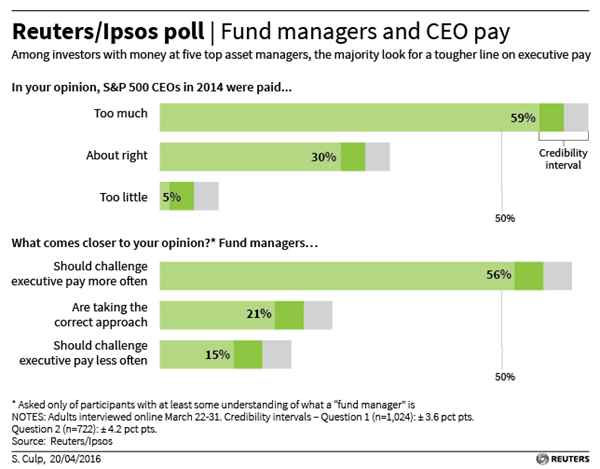|
Money
| Wed Apr 27, 2016 1:20am EDT
Investors want mutual funds to get tougher on CEO pay: Reuters/Ipsos
poll
BOSTON
|
By
Ross Kerber
|

The BlackRock sign
is pictured in the Manhattan borough of New York, in this
October 11, 2015 file photo. .
Reuters/Eduardo
Munoz |
Individual investors are angry about CEO pay, and they want their
mutual fund firms to do something about it.
Top money managers such as BlackRock Inc (BLK.N)
and Vanguard Group oversee trillions of dollars for individuals, but
the firms rarely challenge CEO pay in their proxy votes on behalf of
investors.
That
practice may not match well with the views of their clients. When asked
directly, most investors in American fund firms are critical of CEO pay
packages, according to a national Reuters/Ipsos poll.
Among
respondents, 59 percent said chief executives at S&P 500 companies were
paid "too much," and 56 percent said mutual fund firms "should challenge
executive pay more often."
The
survey was conducted between March 22 and March 31. It included 1,024
people who said they invested with one or more of five top asset managers
and 722 people who said they had at least some understanding of what a
fund manager is. It has a credibility interval of about 4 percentage
points.
For a
graphic showing the views of fund firm investors, see:
tmsnrt.rs/1XJ3gMy
The
poll results underscore a growing angst over large-company CEO pay, which
now runs more than 300 times that of U.S. rank-and-file workers, according
to a study by the AFL-CIO, the largest U.S. federation of unions.
Many
CEOs at major companies have pay packages worth $10 million or more.
One
poll participant, Fargo, North Dakota cabdriver Brent Hartz, said CEO pay
is often "ridiculous" and worries that managers of funds he owns - such as
the $50 billion Vanguard Growth Index Fund (VIGRX.O)
- are too cozy with corporate chiefs.
"It's
almost like they're in cahoots with each other," Hartz said in a telephone
interview.
Asset
managers hold about 30 percent of U.S. corporate stock, giving them great
influence over executive compensation and other corporate governance
issues. Retail investors have about 89 percent of the nearly $16 trillion
held in mutual funds, according to trade group Investment Company
Institute.
All of
the five large firms - BlackRock Inc (BLK.N),
Vanguard Group, Fidelity Investments, State Street Corp (STT.N)
and T. Rowe Price (TROW.O)
- emphasize that executive pay should be linked to company financial
performance. Their voting history, however, shows that they rarely use
their ballots to challenge compensation packages for perceived
underperformance.
Last
year, the firms cast their advisory "say on pay" votes in support of
senior executives 96 percent of the time or more at S&P 500 firms,
according to research firm Proxy Insight.
That
level of support was typical for recent years, as median pay among S&P 500
CEOs rose to $11.3 million in 2014 from $9.4 million in 2010, according to
pay consultant Farient Advisors.
Big
fund firms are facing more questions about their pay votes. BlackRock
faces a shareholder proposal that calls for the world's largest asset
manager to report on how it might bring its voting practices in line with
its stated support of linking pay and performance. BlackRock calls such a
report unnecessary.
BlackRock spokesman Ed Sweeney said the firm believes that talking
privately with company officials is the best way to address pay issues.
Last year, the firm engaged with about 700 U.S. companies and focused on
executive compensation matters in 45 percent of those meetings, he said.
Vanguard spokeswoman Linda Wolohan said via email that executive pay “is a
matter on which people have a wide variety of views (as supported by your
survey results).” Pay is just one factor Vanguard considers in its proxy
voting and it often addresses pay issues with company boards privately,
she said.
Fidelity spokesman Charlie Keller said that its funds “are managed with
one overriding goal: To provide the greatest possible return.”
Spokespeople for T. Rowe Price and State Street declined to comment.
Publicly-traded U.S. companies were required to submit the pay of their
top executives for advisory votes by their investors under the 2010
Dodd-Frank financial reform act. With thousands of votes to cast each year
through electronic platforms, the companies each have their own governance
specialists to oversee their voting decisions.
Retired Massachusetts congressman Barney Frank, one of the act’s creators,
has suggested that funds with highly paid executives make poor overseers
of CEO pay.
BlackRock CEO Laurence Fink, for instance, made $25.8 million last year.
Several leaders of union and state pension funds, which vote against
executive pay more often, said the Reuters/Ipsos poll results suggest that
most investors want funds to take a harder line.
"Ultimately, it has got to be driven by their clients," said Mike
McCauley, a governance officer for the Florida State Board of
Administration, which manages $178 billion.
INEQUALITY DEBATE
Many
respondents supported the status quo. Thirty percent said S&P 500 CEOs are
paid “about right” and 21 percent said the fund firms “are taking the
correct approach” on pay.
In
Byron Center, Michigan, retired Army officer Gabe Hudson worries that the
government might step in to regulate executive pay.
"If
you think the CEOs are getting paid too much, you can always pull your
money out of the fund and go to another fund," Hudson said in an
interview.
The
poll did not ask about societal issues of income inequity, but many
respondents brought it up in interviews. Some also acknowledged they don't
carefully monitor proxy votes.
Barbara Dixon, a retired school teacher who lives in South Carolina, said
she has not closely followed such votes at the $15 billion Fidelity
Magellan Fund (FMAGX.O)
where some of her money is invested.
Still,
she wants the fund to play a role controlling in executive pay. "Someone
who is making millions of dollars does not need all that money," she said.
(Reporting by Ross Kerber; Editing by Carmel Crimmins and Brian Thevenot)
|
News
and Media Division of
Thomson Reuters
© 2016
Reuters All Rights Reserved |
|

